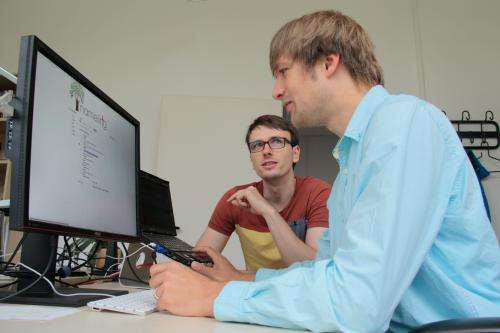Competition: Computer science teams determine the perfect baby name

Should the baby be named after Grandpa Gustav or the soccer star Ronaldo? Computer scientists from the University of Kassel are coordinating an international competition for an Internet name suggestion machine. The algorithms employed are the same ones used by Internet department stores.
Whether it's a boy or girl - a year ago, as the birth of his youngest daughter was approaching, Kassel computer scientist Folke Mitzlaff experienced first-hand how difficult it can be to find a suitable name for your own child. "Unlike in previous times, today's parents take a multitude of factors into consideration when making a decision", says Mitzlaff, who is a research associate in the Department of Knowledge and Data Engineering at the University of Kassel: "Should we follow the trend or consciously disregard it? At the same time, because of global networking, role models, archetypes or even cautionary examples are much more present than they were just two generations ago." Some parents are also unnerved by reports about the social and economic disadvantages experienced by children on account of their given name.
The computer scientist Mitzlaff applied the methods of knowledge engineering to the problem. In early 2012, this resulted in the name search engine Nameling (nameling.net), which provides parents-to-be with suggested names. With expanded functionality, the search engine now uses the same procedure employed by successful Internet department stores: There, a frequently encountered message is "Customers who viewed this item also purchased …". Now the message is: "Parents who like Gustav also like…."
Nameling.net already had capabilities beyond those of a classic lexicon of given names. Instead of simply listing names alphabetically, the search engine asked the user for a name which the user likes and suggested alternatives which appear on the Internet in similar contexts. Now Kassel computer scientists have taken a giant step forwards. "We can personalize the suggestions", explains Mitzlaff. Now users receive recommendations according to search profiles – their own or those of previous Nameling users. In other words: many users who searched for Gustav may have also searched for Theodor or Emil or Adalbert and given these names a positive rating. "Now that namling.net has been up and running for more than a year, we have enough data for this", says Mitzlaff. More than 65,000 users, most of them expecting parents, from over forty countries have used Nameling thus far. In addition, Nameling now offers the option of displaying suggested names based on a list of several names. For example, this enables users to search specifically for first names that complement the names of the parents or siblings.
Precisely how the search engine is programmed is the subject matter of a scientific competition in which 17 research teams or individual researchers from all over the world are participating. In cooperation with Junior Prof. Dr. Robert Jaeschke of the L3S Research Center in Hannover, Prof. Dr. Andreas Hotho of the University of Wurzburg, and his Kassel colleagues Stephan Doerfel and Jürgen Müller, Mitzlaff won the call for proposals for the holding of the 15th "Discovery Challenge". This is an annual international competition within the scope of the "European Conference on Machine Learning and Principles and Practices of Knowledge Discovery" which will next be held in September, 2013 in Prague. As coordinator of the project, he is now inviting researchers from around the world to help expecting parents find a suitable given name.
The participating researchers are programming competing modules, each of which is capable of answering queries. Then queries will be forwarded anonymously to Brazil, the USA or Germany and must be answered by the respective module in less than one second. The winner will be the research team whose recommendation system delivers the best suggestions, in other words, the results most pleasing to the users of Nameling. For the users, the competition behind the search engine is invisible. The competition started on August 1st and will continue until September 23rd.
Systems like Nameling cannot decide for expecting parents which name is the right one for their child. Nevertheless, they can aid parents in their search and also offer alternatives to overly popular names. However, the researchers at the Department of Knowledge and Data Engineering are already thinking about new challenges when it comes to finding names. They want to investigate how opinion mining could be used to draw conclusions about subjective perception of names on the basis of public data from social platforms such as Twitter. In future, Nameling would then, for example, be able to warn parents-to-be if a particular name is tainted by negative prejudices in a cultural or geographical context.
Provided by University of Kassel



















